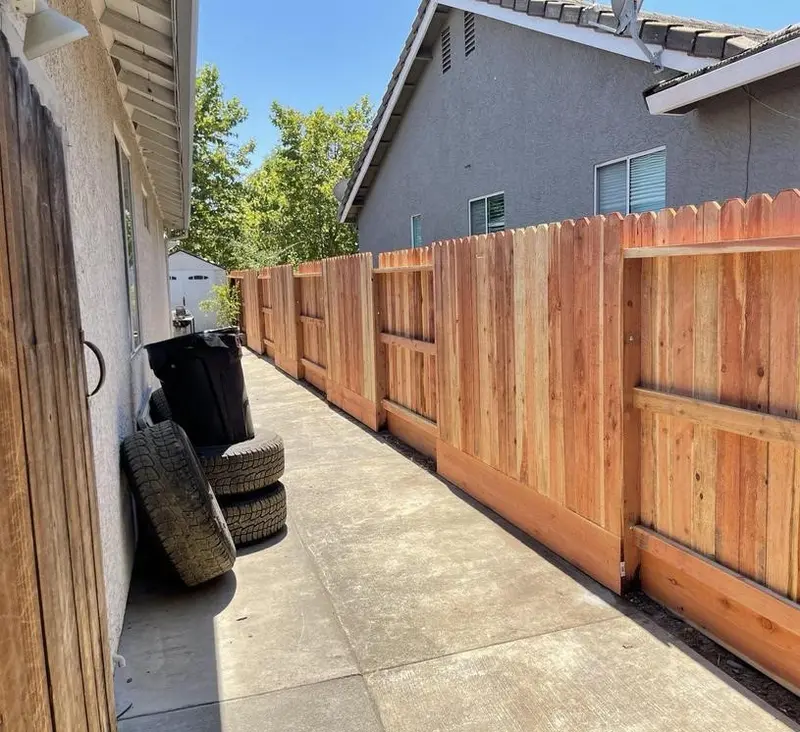The lifespan of a wood fence can vary widely based on several factors, including the type and quality of the wood, the climate in your area, how well it’s maintained, and whether it’s exposed to elements like moisture and sunlight. On average, a well-constructed and properly maintained wood fence can last anywhere from 15 to 30 years or more.
Here are the top 6 factors that can influence the lifespan of a wood fence:
1. Type of Wood: High-quality woods such as redwood and cedar tend to be more resistant to decay and insects, and can therefore last longer thank some of the other alternatives which are only slightly less expensive. In the Northern California area, we install only redwood because we can get a thicker and higher quality redwood ¾ inches thick than we get even with cedar which is 5/8 inch thick. This extra thickness we find is correlated to reduced bowing and twisting of this natural wood product. Building a proper fence is not cheap and we want to ensure that quality materials are used for extra durability.
2. Climate and Environment: Wood fences in wet or humid climates might degrade more quickly due to increased moisture exposure. Extreme heat and strong sunlight can also cause the wood to degrade over time. A couple great things that you can do to protect your fence from the elements and environment are:
1. Turn sprinklers away from your fence so that they do not spray the fence and cause premature rotting
2. Remove vegetation on your fence and cut back other vegetation from the fence so that these bushes and trees do not push or hang on the fence. Additionally this free area will allow your fence to better dry out when its wet and reduce rotting of the wood.
3. Maintenance: Regular maintenance, such as sealing or staining the wood every few years, can significantly extend the life of the fence by protecting it from moisture and other environmental factors. At least every year you should also check your fence lines for rot especially on rails and posts. The best way to check for this is with your eyes as well as with touch. Push on the fence posts as you want the fence line and pick out any posts that seem week or “loose”. Have a licensed fence company come out and check these posts for rot and schedule a repair. Catching these weak (wobbly or leaning) posts and rails early helps make the rest of your fence last longer.
4. Pest Infestations: Termite and other pest infestations can shorten the lifespan of a wood fence if not addressed promptly. Homeowners should visually look for signs of bug posts and schedule with a licensed and experienced pest control company for inspection and treatment. Pests are something best addressed before damage can extend to other parts of the property in addition to the fence.
5. Ground Contact: Fences that are in direct contact with soil are more susceptible to moisture damage and decay, which can lead to a shorter lifespan. A way to make your fence last longer when one neighbor has dirt built up for a planter box for instance is to add a pressure treated buffer/kickboard to the fence to help provide additional support as well as lifespan to the fence. In these areas of soil contact we also recommend hidden steel posts instead of the pressure treated wood posts because the galvanized protected hidden steel posts last much longer than wood posts even especially with ground contact.
6. Construction Quality: A fence that is well-built with proper fasteners and construction techniques is likely to last longer than one that is hastily assembled. You know what our grandparents said: “Good is not cheap, and cheap is not good.” We commonly hear from our great customers that they found the best value in our fence company because we offered a BETTER quality service and product for virtually the same as some of our competitors.
To maximize the lifespan of your redwood fence, it’s important to perform regular maintenance, such as cleaning, sealing, and addressing any signs of decay or damage promptly. If you notice significant deterioration, it’s a good idea to consult with a professional to determine whether repairs or replacement are necessary. Please give us a call or send us a message for a free consultation with our of our fence experts!

